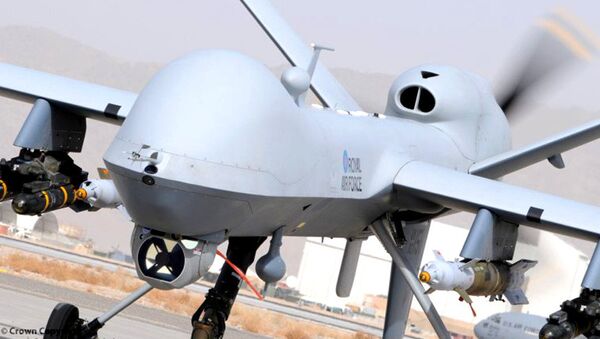The issue came to public prominence when, on 21 August 2015, Reyaad Khan, a 21-year-old British citizen from Cardiff, Wales, was killed by an RAF drone strike in Raqqa, Syria. He had appeared in a recruitment video for ISIL/Daesh and was suspected of being involved in plotting and directing terrorist attacks in the UK and elsewhere.
The issue of deployment of force is a thorny one for the UK, because — although the government has the right to deploy troops without parliament's consent — recent convention says that parliament is given the opportunity to debate and approve or dismiss the deployment.
When voting in favor of military action against Daesh in Iraq in September 2014, the House of Commons expressly did not endorse UK airstrikes in Syria and resolved that any proposal to do so would be subject to a separate vote in Parliament. At the time of the drone strike that killed Reyaad Khan, the Government therefore had the express authorization of the House of Commons to use military force against Daesh in Iraq, but airstrikes in Syria were expressly not endorsed without a separate Commons vote.
The parliamentary Joint Committee on Human Rights opened an inquiry into the matter in view of the "extraordinary seriousness of the taking of life in order to protect the lives of others, which raises important human rights issues; the fact that the Government announced it as a 'new departure' in its policy; and because of the importance we attach, as Parliament's human rights committee, to the rule of law."

Moreover, the use of drones has also become even more controversial, because of UK arms sales to Saudi Arabia, which is using UK weaponry in Yemen.
A UN report in January 2016, detailed more than 100 possible breaches of international humanitarian law by the Saudi-led coalition, confirming a pattern of "widespread and systematic" attacks on civilian targets.
Self-Defense
The UK Government responded saying that the legal basis for the use of force in the latter situation (in the absence of a UN Security Council Resolution authorizing such force) is the international law right of self-defense. The law on self-defense is long-standing, but is recognized in Article 51 of the UN Charter.
Government has ducked central question about lethal drone strikes says Parliamentary Human Rights Committee #drones https://t.co/OnctYoEKv4
— Drone Wars (@Drone_Wars_UK) October 19, 2016
The Government confirmed that it would only use lethal force in response to an "imminent" armed attack where it is necessary to prevent that attack; in that event other means of preventing the attack would have been considered.
However, on the matter of human rights, the UK Government said many of the questions asked by the committee were "hypothetical". The issue concerns Article 2 of the European Convention on Human Rights (ECHR) — the right to life.
Questions, Questions
The Committee responded by saying disappointed that the Government has "refused to clarify its position in relation to the use of lethal force outside armed conflict on the basis that this is hypothetical. What law applies to such uses of lethal force is one of the most important questions raised by the Committee's inquiry and Report, and the Committee expected the Government to make its position clear on this central issue. "
~Drone-Visuality: The Psychology Of Killing https://t.co/ybITNkys2S #drones #cyberwar pic.twitter.com/nBI9DQSdXZ
— Cyber Security Int. (@Cyber_Sec_Int) October 19, 2016
The committee said there were key areas where further explanation is needed:
"Is the Government applying the Laws of War where operations are being carried out in areas outside of armed conflict? What degree of physical power and control over a person who is killed by a drone strike is enough to bring that person within the UK's jurisdiction so that the right to life in the ECHR applies?"
Committee Chair, Harriet Harman said: "The Government has chosen not to answer the most important questions raised by our report concerning its understanding of the legal framework which governs the use of lethal drone strikes outside armed conflict.
"It is simply not good enough for the Government to refuse to answer this on the grounds that it is a hypothetical question, when in the course of our inquiry it stated that it would be prepared to resort to such use of lethal force for counter-terrorism purposes even outside of armed conflict. Parliament is entitled to expect an explanation of the Government's view of the legal justification for such a use of force before it happens, rather than wait until it does," she added.



